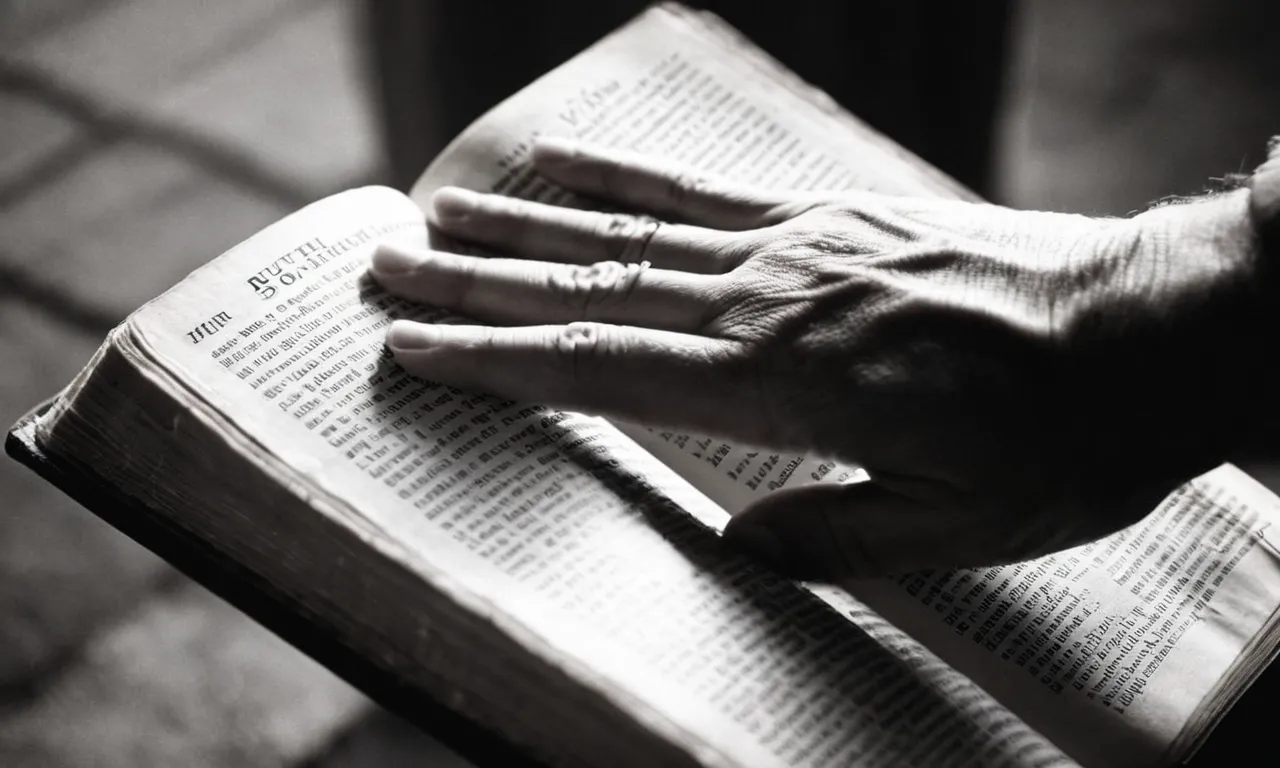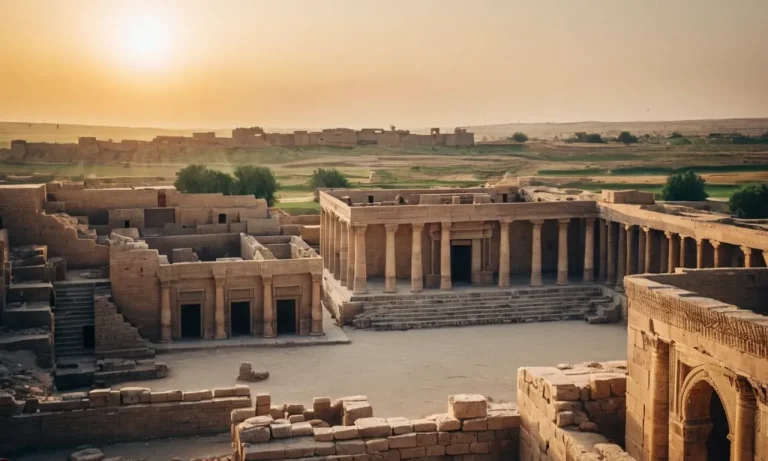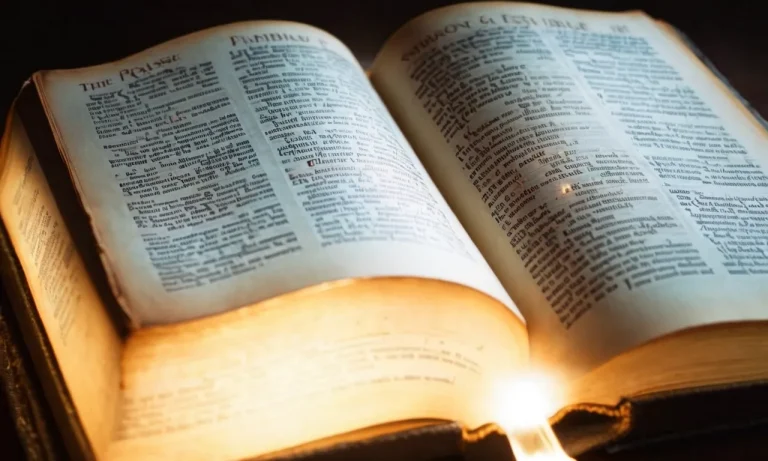Bible Characters Who Demonstrated Goodness
The Bible contains many stories of people who showed admirable goodness in their words, actions, and lives. If you’re looking for biblical examples of goodness, here are some of the most noteworthy:
Noah, Abraham, Joseph, Moses, Ruth, David, Daniel, Mary Magdalene
Noah’s Obedience and Faith in God
Noah followed God’s commands to build the ark
Noah was a righteous man who walked with God during a time of great evil and corruption on earth (Genesis 6:9). When God saw the rampant wickedness in the world and decided to send a flood to wipe out sinful humanity, He chose Noah to build an ark that would save him, his family, and two of every kind of animal (Genesis 6-9).
This was no small task, as the ark needed to be large enough to hold all these passengers for an extended period of time. Yet despite the enormous scale of the project, “Noah did everything just as God commanded him” (Genesis 6:22).
For years as he built the massive ship, Noah demonstrated incredible faith and perseverance. He trusted God even when the request seemed absurd and impossible. Noah did not question or resist God’s directions but obeyed despite the extreme difficulty of the task.
His righteous response stands out at a time when all other people rejected God’s commands. Noah’s unwavering faith and trust in the word of the Lord led to his family’s deliverance during the devastating global flood.
He persevered despite mockery from others
As Noah constructed the enormous ark according to God’s specifications, people around him likely mocked and ridiculed his efforts (Genesis 6:22). After all, there was no ocean or river nearby for such a massive boat.
From a human perspective, Noah’s obedience to God’s command to build a giant vessel made zero sense. Yet the Bible says Noah did not waver but remained faithful, continuing the divinely ordained work despite the scorn and disbelief of others.
For decades as he built the ark, he persevered in the task.
Noah demonstrated remarkable patience and resilience as he followed the Lord’s directives. His steadfast spirit withstood the intense pressure of the outside world questioning and criticizing his actions. Noah kept his eyes fixed on God and not on the distractions around him.
For 100 years, Noah stayed the course and did not abandon the calling that God had placed on his life (Genesis 5:32). His commitment never diminished despite the opposition. Rather than succumb to peer pressure, Noah clung tightly to his faith.
His perseverance and steadfast endurance speak volumes about his rock-solid trust in God Almighty.
Abraham’s Hospitality and Charity
Abraham welcomed three strangers and showed them generosity
The biblical account in Genesis 18 describes how Abraham provided outstanding hospitality by welcoming three strangers who appeared near his tent. Though he did not know who they were at first, Abraham warmly invited them to come rest in the shade and brought them water to wash their feet.
He then arranged for an impressive meal to be prepared while they rested under the tree.
Abraham told his wife Sarah and the servants to quickly make cakes with flour while he selected a tender calf for a servant to prepare. As the host, Abraham stood and waited on them while they were seated in the shade.
His quick actions and eagerness to serve demonstrated his generosity and virtue of hospitality to strangers and travelers, which was highly valued in his culture. His care for them turned out to be caring for angels.
He bargained with God to spare Sodom and Gomorrah for the sake of the righteous
When Abraham learned of God’s plans to destroy Sodom and Gomorrah for their wickedness, Abraham appealed to God’s sense of justice. He asked if God would spare the cities if 50 righteous people lived there, and continued to bargain it down in increments of 10, hoping to save the cities for the sake of any righteous people living there.
This account in Genesis 18:16-33 demonstrates Abraham’s courage to approach God in this manner as well as his concern for justice and mercy. Though the cities were ultimately destroyed, the episode illustrates Abraham’s charitable plea for any righteous inhabitants.
Joseph’s Forgiveness Towards His Brothers
Joseph forgave his brothers for selling him into slavery
Joseph’s brothers were jealous of him being their father Jacob’s favorite son. When Joseph was 17, his brothers plotted to kill him but instead sold him into slavery to passing Midianite merchants (Genesis 37:12-36).
Joseph was taken to Egypt and sold again to Potiphar, the captain of Pharaoh’s guard (Genesis 39:1). However, Joseph remained faithful to God despite his difficult circumstances in slavery and later being falsely accused and imprisoned (Genesis 39:20).
Years later when Joseph became the second most powerful man in Egypt, his brothers traveled to Egypt to buy food during the famine. Joseph recognized them but they did not recognize Joseph. Joseph tested his brothers before revealing his identity to see if their hearts had changed.
When Joseph saw that the brothers regretted what they had done to him, Joseph forgave them, saying “Do not be distressed and do not be angry with yourselves for selling me here, because it was to save lives that God sent me ahead of you” (Genesis 45:5).
He helped his brothers and their families during the famine
After revealing himself as their long lost brother, Joseph invited his brothers and father to live in Egypt. He gave them the land of Goshen to settle in and provided food for them during the 5 remaining years of famine (Genesis 45:10).
Joseph saved not only Egypt but also his family from starvation through his leadership during the famine. When his father Jacob died, Joseph reassured his brothers again saying “You intended to harm me, but God intended it for good to accomplish what is now being done, the saving of many lives” (Genesis 50:20).
Joseph’s forgiveness and generosity towards his brothers demonstrated goodness despite their past cruelty to him. Joseph saw God’s greater plan through his trials. His godly character offers an inspirational example of forgiveness and redemption for believers today.
As Martin Luther King Jr said, “We must develop and maintain the capacity to forgive. He who is devoid of the power to forgive is devoid of the power to love.”
Moses’ Service and Leadership
Moses repeatedly asked Pharaoh to let God’s people go
As recorded in the book of Exodus, Moses was chosen by God to lead the Israelites out of slavery in Egypt. After encountering God at the burning bush, Moses was emboldened to go before Pharaoh numerous times and request that he let the Israelites leave Egypt to worship their God.
Even when Pharaoh refused and placed heavier burdens on the Israelites, Moses persisted in appealing to Pharaoh again and again on their behalf saying, “This is what the LORD, the God of Israel, says: ‘Let my people go. ‘” (Exodus 5:1).
Moses demonstrated determination and commitment in his pleas to Pharaoh for the freedom of God’s people.
According to biblical historians, Moses went before Pharaoh up to 10 times over a span of months/years begging him to grant freedom to the Israelites. Each time a plague would come upon Egypt after Pharaoh’s refusal to comply, yet the Bible says “the LORD hardened Pharaoh’s heart” (Exodus 10:20) and he kept stubbornly opposing their release.
Moses exemplified perseverance and steadfast leadership in the midst of opposition and testing as he continued interceding for God’s people.
He led the Israelites out of Egypt and interceded for them to God
After the 10th and most severe plague came upon Egypt, Pharaoh finally relented and allowed Moses to lead the Israelites out of slavery. Exodus 12:37 states that there were 600,000 Israelite men alone, plus women and children, who Moses helped guide out of Egypt during the mass exodus.
This emphasizes Moses’ capability as an organizer and leader. Even when Pharaoh changed his mind again and sent his army pursuing them, Moses stretched out his hand and parted the Red Sea for the millions of Israelites to cross safely to the other side according to Exodus 14.
Truly Moses was a servant-leader of enormous proportions.
Furthermore, Moses continued intervening between God and the Israelites for the rest of their wilderness wanderings up to the Promised Land. For example, within months of their exodus from Egypt, Moses had to intercede for the Israelites again after they fell into idolatry and immorality while he was on Mt.
Sinai receiving the 10 Commandments from God (Exodus 32). The Bible says repeatedly that Moses “sought the favor of the LORD” (Exodus 33:12) and pleaded for mercy on behalf of God’s people when they sinned greatly.
Through persistent intercessory prayer, Moses exhibited goodness and grace as a leader toward his people.
Ruth’s Selfless Devotion to Naomi
Ruth stayed with her mother-in-law Naomi after her husband died
After both her husband and brother-in-law died, Ruth faced a difficult decision. According to the customs of the time, she could have easily returned to live with her parents in Moab. However, Ruth chose to stay with her widowed mother-in-law Naomi, despite Naomi encouraging her to go back to her family (Ruth 1:8-18).
This demonstrates Ruth’s amazing commitment and loyalty in a time when widowed women were extremely vulnerable.
Ruth told Naomi, “Where you go I will go, and where you stay I will stay. Your people will be my people and your God my God” (Ruth 1:16). This stirring statement reveals Ruth’s selfless determination to follow Naomi wherever she went.
She was willing to leave behind her homeland and family to care for her grieving mother-in-law in a foreign land.
Ruth showed incredible kindness by giving priority to meeting the needs of Naomi above her own. Her devotion went far beyond typical family loyalty. According to historian Josephus, she was a princess in Moab, so her sacrifice was even more profound considering the comfortable lifestyle she left behind.
She worked hard to provide for them both
Arriving destitute in Bethlehem, Ruth volunteered to pick up leftover grain in local harvest fields to provide food for herself and Naomi. This was difficult, menial work that demonstrated tremendous effort to care for her mother-in-law (Ruth 2:2).
As a foreigner, Ruth did not have the usual legal right to glean fields. However, she found favor with a man named Boaz who instructed his workers to intentionally leave grain for her (Ruth 2:15-16). Ruth worked from early morning until evening to gather an ephah of barley, which was a substantial quantity (Ruth 2:17).
This gleaning work required Ruth to labor outside all day in the hot sun while competing with others for grain even amidst harassment and threats from men (Deuteronomy 24:19-22). Yet Ruth persevered and worked extraordinarily hard to provide for herself and Naomi despite the challenges she faced.
| Resource | Quote on Ruth’s Sacrifice |
| Got Questions | “Ruth’s kindness and selfless nature are exceptional…Ruth gives up everything – her native land, her family, her possessions, and her people – to cling to someone who can offer her nothing but hardship and pain.” |
| Bible Study Tools | “Ruth demonstrated extraordinary sacrificial love towards Naomi. She was willing to give up everything to care for her mother-in-law.” |
Ruth’s dedication to Naomi gives us a powerful example of self-denial. She left behind her own people and prospects to serve someone in need. Her tireless effort to provide food in the harvest fields reflects incredible diligence and stamina.
Ruth’s devotion beautifully puts others before self – a virtue all Christians should seek to emulate.
David’s Mercy Towards His Enemies
David spared Saul’s life twice when he had the chance to kill him
David had two prime opportunities to kill King Saul, who was pursuing him out of jealous rage, but he refused to harm the LORD’s anointed. Once while Saul was relieving himself in a cave, David secretly cut off a corner of his robe and later confronted Saul with the piece of cloth as proof that he could have killed him.
On another occasion, David sneaked into Saul’s camp at night while he and his men were asleep. One of David’s men urged him to allow the killing of Saul, but David said “The LORD forbid that I should do such a thing to my master, the LORD’s anointed, or lay my hand on him; for he is the anointed of the LORD.
“ So he spared Saul again.
He mourned Saul and Jonathan after their deaths
After Saul and his son Jonathan were killed in battle against the Philistines, David sang an eloquent lament, mourning their loss. He ordered the men of Judah to be taught the Song of the Bow in honor of Saul and Jonathan’s memory.
David referred to Saul and Jonathan as “beloved and pleasant” and stated that their love for each other was greater than the love of women. Despite Saul’s years of pursuing him out of jealousy, David looked past it and gave honor to Saul in his death, even referring to him as his “brother.”
Daniel’s Integrity and Faithfulness
Daniel was an Israelite who lived in the 6th century BC. He was taken captive when Jerusalem was conquered by the Babylonians in 605 BC and brought to Babylon to be trained in King Nebuchadnezzar’s court.
Despite being removed from his homeland, Daniel maintained his devotion to God and is an amazing example of integrity and faithfulness.
Daniel maintained his devotion to God in Babylon
Though surrounded by a pagan culture and polytheistic religion in Babylon, Daniel never wavered in his commitment to the one true God. According to the book of Daniel, he continued to pray toward Jerusalem three times a day (Daniel 6:10), which was the custom of the Jews.
He also refused to eat foods that were unclean or sacrificed to idols, choosing a vegetarian diet instead (Daniel 1:8-16). Daniel persevered in worshipping God even when it meant facing dire consequences.
One key example is found in Daniel 6, when jealous officials convinced King Darius to sign an injunction that prohibited prayer to any god or person other than the king for 30 days. Knowing that the penalty for breaking this law was to be thrown into a den of lions, Daniel still “got down on his knees and prayed, giving thanks to his God, just as he had done before” (Daniel 6:10).
Daniel could have easily rationalized compromising his faith in this instance, but he courageously continued his faithful devotion to God.
He refused to stop praying or worshipping God, even under threat of death
As mentioned above, Daniel boldly defied King Darius’ decree prohibiting prayer to anyone but the king. He refused to hide his faith even when threatened with execution. This shows Daniel’s steadfast commitment to God. He valued his relationship with God above his position in the kingdom.
Even high governmental officials tried to intervene, urging Daniel to stop praying openly for just 30 days to save his life. But Daniel chose obedience to God over personal safety.
In the end, God protected Daniel by shutting the lions’ mouths when he was thrown into their den (Daniel 6:22). The king then made another decree, commanding that all people in the kingdom should “tremble and fear before the God of Daniel” (Daniel 6:26).
Daniel’s courageous example of uncompromising faith impacted an entire nation. His steadfast devotion to God despite intense pressure inspires believers today to remain faithful no matter the cost.
Mary Magdalene’s Service and Devotion
Mary Magdalene generously supported Jesus’ ministry
Mary Magdalene was one of Jesus’ most dedicated followers. She helped provide financially for Jesus and His disciples as they traveled and preached across Judea. According to the Gospel of Luke, Mary Magdalene was among a group of women who provided for Jesus “out of their resources” (Luke 8:2-3).
This indicates Mary’s generosity and sacrifice to support the early Christian movement.
Some scholars believe Mary Magdalene likely came from a wealthy family and used her money to assist Jesus’ ministry. Her hometown was Magdala, a fishing village on the Sea of Galilee that archaeologists discovered had expensive dyed wool and textile trade during Jesus’ lifetime.
This suggests Mary had the means to generously give to Jesus’ ministry and care for His practical needs.
She remained faithful through Jesus’ crucifixion and resurrection
Not only did Mary Magdalene generously support Jesus’ ministry financially, but she remained intensely faithful to Christ during His darkest hours. All four Gospels emphasize Mary Magdalene’s devotion by naming her among the women disciples who watched Jesus’ agonizing crucifixion (Matthew 27:56, Mark 15:40, John 19:25).
Mary continued serving Jesus until the bloody end.
Moreover, Mary was a courageous follower of Christ after His death. She went to Jesus’ tomb to properly care for His body while the male disciples hid in fear (Mark 16:1, Luke 24:1). To her shock, Jesus’ tomb lay empty, and she became the first disciple to encounter the resurrected Christ (John 20:11-18).
Mary’s steadfast service, risky care for Jesus’ body, and witness of His resurrection Displays her remarkable devotion amid distress.
Conclusion
The Bible showcases many examples of admirable goodness and virtue. As we read these stories, we can find models to emulate in cultivating goodness in our own lives.
Noah, Abraham, Joseph, Moses, Ruth, David, Daniel and Mary Magdalene demonstrated faith, forgiveness, service, devotion, mercy and integrity in difficult times. Their examples continue to inspire goodness today.








